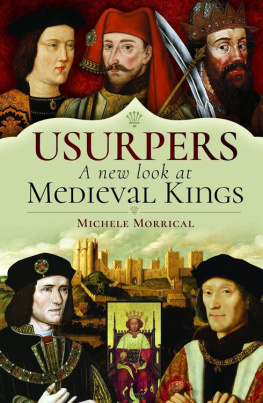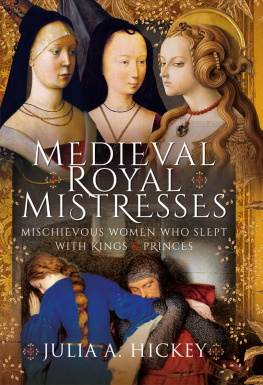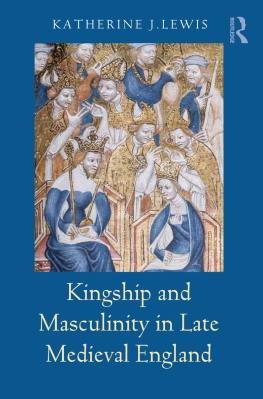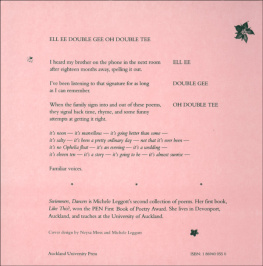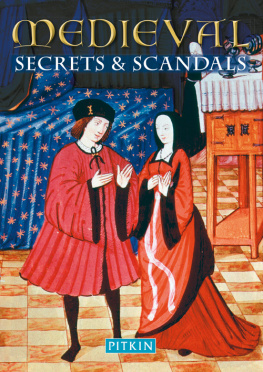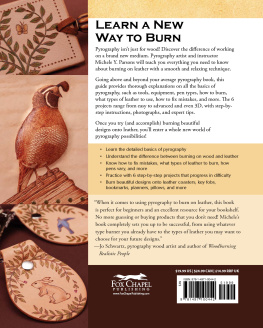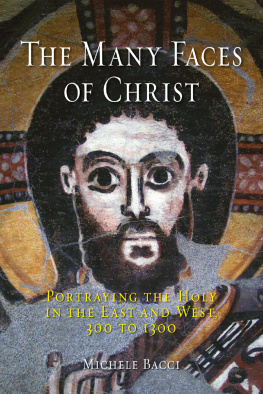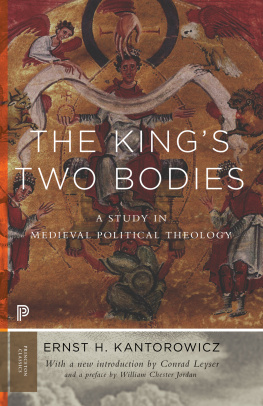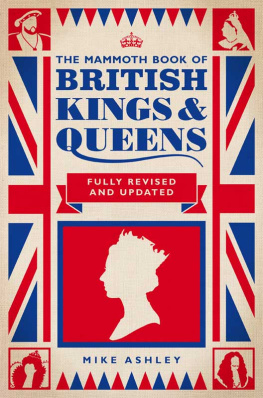Michele Morrical - Usurpers, a New Look at Medieval Kings
Here you can read online Michele Morrical - Usurpers, a New Look at Medieval Kings full text of the book (entire story) in english for free. Download pdf and epub, get meaning, cover and reviews about this ebook. year: 2021, publisher: Pen and Sword History, genre: History. Description of the work, (preface) as well as reviews are available. Best literature library LitArk.com created for fans of good reading and offers a wide selection of genres:
Romance novel
Science fiction
Adventure
Detective
Science
History
Home and family
Prose
Art
Politics
Computer
Non-fiction
Religion
Business
Children
Humor
Choose a favorite category and find really read worthwhile books. Enjoy immersion in the world of imagination, feel the emotions of the characters or learn something new for yourself, make an fascinating discovery.
- Book:Usurpers, a New Look at Medieval Kings
- Author:
- Publisher:Pen and Sword History
- Genre:
- Year:2021
- Rating:5 / 5
- Favourites:Add to favourites
- Your mark:
- 100
- 1
- 2
- 3
- 4
- 5
Usurpers, a New Look at Medieval Kings: summary, description and annotation
We offer to read an annotation, description, summary or preface (depends on what the author of the book "Usurpers, a New Look at Medieval Kings" wrote himself). If you haven't found the necessary information about the book — write in the comments, we will try to find it.
Usurpers, a New Look at Medieval Kings — read online for free the complete book (whole text) full work
Below is the text of the book, divided by pages. System saving the place of the last page read, allows you to conveniently read the book "Usurpers, a New Look at Medieval Kings" online for free, without having to search again every time where you left off. Put a bookmark, and you can go to the page where you finished reading at any time.
Font size:
Interval:
Bookmark:
Usurpers, A New Look at Medieval Kings
Usurpers, A New Look at Medieval Kings
Michele Morrical

First published in Great Britain in 2021 by
Pen & Sword History
An imprint of
Pen & Sword Books Ltd
Yorkshire Philadelphia
Copyright Michele Morrical 2021
ISBN 978 1 52677 950 2
eISBN 9781526779519
The right of Michele Morrical to be identified as Author of this work has been asserted by her in accordance with the Copyright, Designs and Patents Act 1988.
A CIP catalogue record for this book is available from the British Library.
All rights reserved. No part of this book may be reproduced or transmitted in any form or by any means, electronic or mechanical including photocopying, recording or by any information storage and retrieval system, without permission from the Publisher in writing.
Pen & Sword Books Limited incorporates the imprints of Atlas, Archaeology, Aviation, Discovery, Family History, Fiction, History, Maritime, Military, Military Classics, Politics, Select, Transport, True Crime, Air World, Frontline Publishing, Leo Cooper, Remember When, Seaforth Publishing, The Praetorian Press, Wharncliffe Local History, Wharncliffe Transport, Wharncliffe True Crime and White Owl.
For a complete list of Pen & Sword titles please contact
PEN & SWORD BOOKS LIMITED
47 Church Street, Barnsley, South Yorkshire, S70 2AS, England
E-mail: enquiries@pen-and-sword.co.uk
Website: www.pen-and-sword.co.uk
Or
PEN AND SWORD BOOKS
1950 Lawrence Rd, Havertown, PA 19083, USA
E-mail: Uspen-and-sword@casematepublishers.com
Website: www.penandswordbooks.com
In the Middle Ages, England had to contend with a string of usurpers who deposed reigning kings and seized power for their own houses, thereby disrupting the British monarchy and ultimately changing the course of English history. There have been many infamous usurpers to come out of medieval England including William the Conqueror, King Stephen, Henry Bolingbroke, Edward IV, Richard III, and Henry Tudor. But did they really deserve the title of usurper or were they unfairly vilified by biased chroniclers and royal propaganda?
In this book we will examine the lives of six medieval kings, the circumstances that brought each man to power, and whether or not they really usurped their thrones. Along the way readers will hear stories of some of the most fascinating and daring people from medieval Europe, including Empress Matilda, the first woman who nearly succeeded at becoming queen of England; Eleanor of Aquitaine, the queen of both France and England; the cruel reign of Richard II which caused his own family to revolt against him; the struggle between Henry VI, Margaret of Anjou, Richard of York, and Edward IV during the Wars of the Roses; Richard III and his monstrous reputation as a child-killer; and Henry VII, who came out of obscurity and established arguably the most famous royal family of all: the Tudors.
The reader might be surprised to know that not all these kings were really usurpers, at least not in this authors opinion. The purpose of this book is to correct popular misconceptions and long-held beliefs about these six kings who have been traditionally labeled as usurpers. One of the most difficult aspects of doing historical research during this time period is the lack of trustworthy sources, or sometimes the lack of any sources at all. Notably, you have the chroniclers who are clearly biased, perhaps even hired by a king to write the official history of their reign, so its important to take those accounts with a grain of salt. To unravel the truth, I have relied on a variety of sources, including medieval chroniclers, vintage biographies from the late-nineteenth and early-twentieth centuries, and the newest research by modern-day historians for the most accurate, up-to-date information we have on the lives of these infamous medieval kings of England.
Part I
William the Conqueror (10661087)
Life in early medieval England was often a frightening, brutal experience for its residents. Between the years 410 to 1066, Englands inhabitants endured repeated invasions from Continental intruders, resulting in the loss of land, the slaughter of their families, and forced submission to foreign kings. Prior to the centuries of invasions, England had some manner of safety and protection as it was under the rule of the mighty Roman Empire. When the Roman Empire fell in 410 AD, England found itself isolated and unprotected with no overlord to protect it from the threat of foreign invaders. Having no cohesive united defence, such as a standing army or castles to protect its people, England found itself in a power vacuum that many foreign countries were quick to take advantage of. After the fall of Rome, the vulnerable island of Great Britain became an easy target for invasion.
The first large scale foreign invasion came from a group of German and Danish migrants who later became known as the Anglo-Saxons. Their three tribes, the Angles, Saxons, and Jutes, sailed to England shortly after the fall of the Roman Empire and conquered both the eastern and southern territories. They hadnt just come to England to conquer it and return home with their booty: they had come to stay. England had a wealth of natural resources and with no English ruler to oppose them, it was quite easy for them to move in, establish rule over all the occupants, and divide the land up among themselves.
The Anglo-Saxons organised England into seven separate kingdoms: East Anglia, Northumbria, Mercia, Wessex, Sussex, Essex, and Kent. The seven kingdoms of the Anglo-Saxons operated independently from each other, meaning they had their own rulers, their own policies, customs, and even languages. They spent the entirety of the 400-year establishment fighting against each other to expand their territories because more land meant more income from taxes. It was one of the easiest ways to quickly enrich themselves and more money meant more power.
In the 860s, a new, more serious threat emerged: the Vikings. These Nordic warriors had begun terrorising all of Europe with their technologically advanced longships and their superior military skills. By 871 they had successfully overtaken every single Anglo-Saxon kingdom except for Wessex which at that time was ruled by King Alfred. Alfred successfully fought off the Vikings for many years and also held them back by negotiating peace treaties. Alfred was unrelenting in the defence of his kingdom and after fifteen years of conflict, the Vikings finally gave up and the last of the invaders left England. Alfred was the last ruler standing and in 886, he was appointed King of the Anglo-Saxons, having rule over all the seven kingdoms of England.
Over the next thirteen years of his reign, Alfred managed to establish England as a single, unified kingdom. He organised its military defences, established boroughs, and built large fortifications to protect citizens and soldiers. Not only was he a brilliant military strategist, he was also a very educated man. He had personally translated many important religious works into English and encouraged the Anglo-Saxons to adopt English in the vernacular rather than Latin which was a language only the nobility could read. He was a very pious man and felt it his duty to convert his people from the old pagan ways to his newly adopted religion: Christianity.
King Alfred the Great died on 26 October 899 from an unknown abdominal illness or disease that had plagued him throughout his life. He was succeeded by his eldest son, Edward the Elder, and thereafter King Alfreds bloodline ruled England for the next 130 years. These years were marked by a constant state of war against Scandinavian invaders as evidenced by the relatively short reigns of Alfreds descendants. During those 130 years, nine of Alfreds heirs ruled which gives them each an average reign of only fourteen years. It was indeed a dangerous life, not just for the inhabitants of England but especially for the rulers.
Next pageFont size:
Interval:
Bookmark:
Similar books «Usurpers, a New Look at Medieval Kings»
Look at similar books to Usurpers, a New Look at Medieval Kings. We have selected literature similar in name and meaning in the hope of providing readers with more options to find new, interesting, not yet read works.
Discussion, reviews of the book Usurpers, a New Look at Medieval Kings and just readers' own opinions. Leave your comments, write what you think about the work, its meaning or the main characters. Specify what exactly you liked and what you didn't like, and why you think so.

